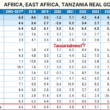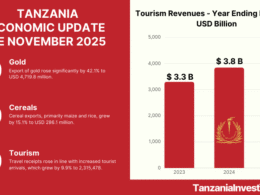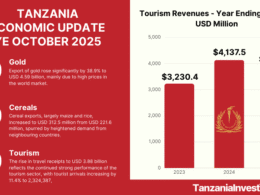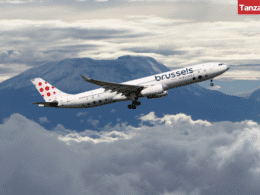TANZANIAINVEST has been interviewing Mr. Mahad Abdulahi Nur, Managing Director of the Paradise Holiday Resort in Bagamoyo, to learn about this emerging destination and about the Tanzania tourism sector outlook.
TI: When did you start your activities in Bagamoyo and why?
Mahad Abdulahi – Paradise Holiday Resort: We have been here since 1997, for approximately eight years now.
We started this hotel from the beginning of the tourism industry in this city.
We were among the very first investors to come here in this historical town of Bagamoyo.
When we arrived here there was only one Italian owned hotel, so we were the second investors.
We decided to invest in this destination mainly because of its uniqueness.{xtypo_quote_right}We decided to invest in this destination mainly because of its uniqueness.{/xtypo_quote_right}
Bagamoyo, which was once capital of Tanganyika, is a destination that is very close yet still far enough from Dar es Salaam.
Secondly, Bagamoyo has beautiful beaches, wildlife, culture and history, including the one related to slave trade.
There is so much to do for holidaymakers unlike in Dar es Salaam, which remains a business centre.
When we invested, we did not want to do it too far from Dar Es Salaam either so Bagamoyo represented for us, the most ideal place to invest.
It has the right recipe to make a good tourism destination.
TI: What is the profile of your clientele?
MA: Now, about 80% are local tourists, of which 75% are business related.
Local business tourists are easier to get because they are based in the country, hence marketing is more simple and more direct, unlike the overseas markets, which are a bit more complicated and require more aggressive and expensive marketing activities.{xtypo_quote_left}In Bagamoyo we have the advantage of offering both holiday as well as business related tourism.{/xtypo_quote_left}
The majority of hotels in Dar es Salaam are living mainly because of business tourism, while in the north and in Zanzibar it is vice versa.
Again, in Bagamoyo we have the advantage of offering both holiday as well as business related tourism.
Tourists can get out of the buzz of Dar es Salaam without having to travel too far.
TI: How would you assess the overall results in your investments from 1997, when you first arrived in Bagamoyo, to date?
MA: In 1997, we started with twenty-four rooms, and with very little infrastructure or facilities within the hotel.
Now, we have ninety rooms and that should tell you a lot.
Overall, I would say that our results have been better than what we could have expected.
We have been a single operator so far, running one facility.
We want to grow in this market to become a chain, expanding in Arusha, Selous and Dar es Salaam.
With the past trend and the pace at which we have developed, I do not think we will comprise less than five or six hotels within years.
Bagamoyo Tourism Overview
TI: How would you define the Bagamoyo tourism offer in when compared to other destinations within Tanzania that may represent a similar tourism offer?
MA: Bagamoyo is a new destination unlike other parts of the country that are well known and well marketed globally.
Bagamoyo is a truly emerging destination.{xtypo_quote_right}Bagamoyo is a truly emerging destination […] because there are no other places in the country where you can find beaches and wildlife, history and culture all at once.{/xtypo_quote_right}
I personally feel it has a lot to offer because there are no other places in the country where you can find beaches and wildlife, history and culture all at once.
The Saadani game reserve is only forty-five miles from here.
Unfortunately, accessibility it is still not adequate and to travel for such short distance takes hours.
TI: What are the infrastructures that you require the most in Bagamoyo?
MA: Firstly, a road link to Saadani game reserve because in such way we would be able to attract tourists to fly directly from overseas to Tanzania.
For beach tourism we have a much more consolidated destination in the region such as Zanzibar, but with proper access and with our wildlife offer, we would have a greater competitive advantage.
Secondly, if we had some sort of linkup with Zanzibar such as shuttle service by plane or boat, we could take out some of the tourists arriving there and function as a safari complement.
Finally, we would need an airfield so it would be easier to welcome flights from Arusha or Zanzibar, the two main tourist entry points in the country.
Tanzania Tourism Outlook
TI: How do you think the Tanzania tourism sector will develop?
MA: I think, in the long term, emphasis will be on the southern circuit, because of the wish of the private sector.
This is looking at an opportunity for adequate ROI, where Arusha and Zanzibar have already many investors and many hotels.
{xtypo_quote_left}In the long term, emphasis will be on the southern circuit.{/xtypo_quote_left}Undoubtedly these destinations are there and will continue to be there.
Zanzibar, however, has recently showed a certain degree of instability in its pre-election period and lately there have been some security issues.
It is obviously a beautiful destination, but I think that the mainland is soon to be a main a focal point for beach tourism in Tanzania.
Unfortunately, so far there is not a lot that has been done to promote the southern circuit, within which Bagamoyo is included, by the government.
TI: What do you think about the high yield-low volume development strategy pursued by the government?
MA: Although the government is aiming to develop tourism of high yield-low volume, as opposed to the strategy pursued by much more developed markets such as Kenya, I do not thing this will work in the long run because hotels and facilities are coming up.
In Bagamoyo alone, seven years ago we were two hotels, now there are eight of us.
So one way or another, if the government does not play a main role, the private sector will take the lead to go out and promote the establishments and facilities as much as they can.
Also the concept of targeting fewer tourist arrivals is not in accordance with the economic development of the country, which needs a tourism sector that generates employment and welcome more investors, just like Dubai.
I think the reality is simply that the government does not have the necessary financing to build whatever infrastructures are needed in order to develop mass market.{xtypo_quote}[The country] needs a tourism sector that generates employment and welcome more investors.{/xtypo_quote}
TI: What makes Tanzania a competitive alternative to similar tourism offers like those in Kenya, for example?
MA: I think if you look at the two countries, Kenya has more infrastructures and facilities, prices and rates are also more competitive so Kenya has lot of advantages over Tanzania.
TI: Why did you invest in Tanzania rather than in Kenya?
MA: The tourism industry has gone down in the last few years in Kenya, although it is an industry which has been there for the last twenty to twenty-five years.
We then felt we should invest in a country like Tanzania with upcoming opportunities, rather that in a mature market.
TI: Can Tanzania become a consolidated international tourist destination?
MA: If we put in place the right facilities, definitely yes.
More needs to be done to open up the infrastructure and the country so we can have more overseas tourism.
We also need to do more promotion abroad, globally.
TI: How long do you think this will take?
MA: In ten years Tanzania will be there.
There is a lot to be done by the government to make sure such development is well coordinated and not done in pieces and bites as it may have happened sometimes here.
Tanzania has been known, and will still be known in the next ten years, for its wildlife, but if we really want to attract international tourism and become a consolidated international tourism destination, there is much more we should do and develop apart from wildlife.
This country is rich with resources and potential, but the focus has only been on wildlife and that trend will continue unless a completely different develoment strategy is undertaken in order to promote places like Bagamoyo.
TI: What is your piece of advice to any investor looking to invest in tourism in Tanzania?
MA: There is still a lot of room to invest in the tourism industry in Tanzania.
The potential is there.
Some say Tanzania is an expensive destination and I don’t know what contributes the most to that, whether it is the cost of flying here or the cost of hotels. {xtypo_quote_right}There is still a lot of room to invest in the tourism industry in Tanzania. The potential is there.{/xtypo_quote_right}
Having said that, there is a lot of room for growth.
I would definitely suggest to them to come and invest now, to take advantage of such development potential.
At the same time, they should undergo the necessary feasibility studies on the market and zone where they are looking to invest, as Tanzania is a wide country and whether to invest in Zanzibar or Dar es Salaam, in wildlife rather than beaches, is a different matter.
Not all investors, I believe, do adequate feasibility studies, as some example of new investment in hotels are showing us, where you may wonder what target market they are trying to reach.










